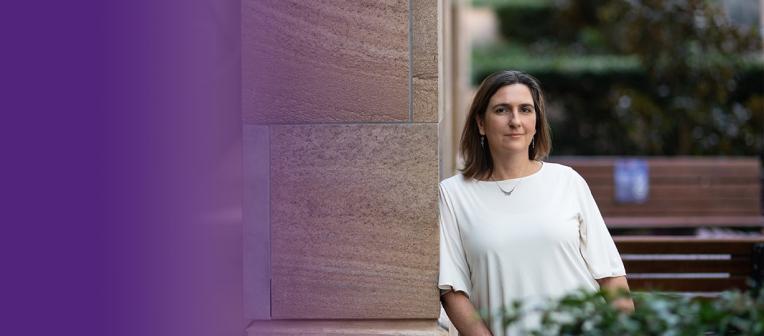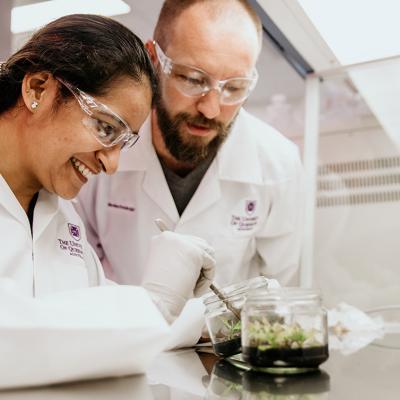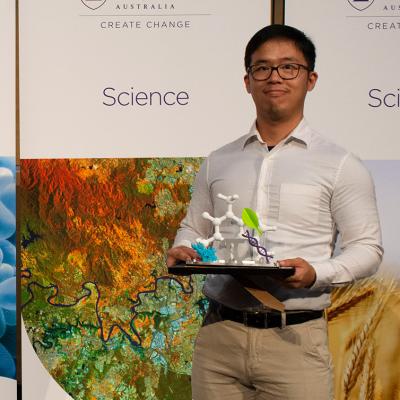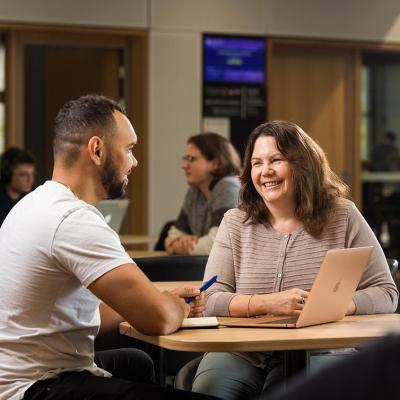Professor Avril Robertson reveals how a biotechnology program prepares students for scientific breakthroughs and commercial success – the perfect combination for a career in science.
Pursuing a passion for science is a walk in the lab, but it isn’t a walk in the park. Succeeding in this field takes more than scientific skills – it requires dedication, perseverance and a comprehensive range of abilities, including business smarts.
Science programs at The University of Queensland take a step beyond the academic to ensure graduates learn everything they need to be ready for what lies beyond their degree.
Professor Avril Robertson, Director of UQ’s Biotechnology Program, sees the Master of Biotechnology as one such program that truly prepares students for an academically and commercially successful career.
“What really sets biotechnology students apart from the scientific crowd is the associated knowledge and smartness around the path to commercialisation,” she says.
“These scientific and business skillsets are a powerful combination that lead to an astounding breadth of career options well beyond the purely scientific.”
Commercial skills for scientists
In addition to developing high-quality, advanced scientific knowledge, Master of Biotechnology students learn to:
- assess and protect intellectual property
- conduct competitor analysis
- examine market value
- understand quality systems
- meet regulatory requirements
- follow best practice in a manufacturing, laboratory and/or clinical setting.
Avril sees the opportunities for biotech graduates as virtually limitless with pathways including:
- executive careers in a company or venture capital investment firm
- government positions
- clinical trials management
- regulatory affairs
- start-up companies
- product development.
And it’s not just about making money, though that’s certainly a strong selling point. Avril believes professionals in this field have unique power to create global change.
“Biotechnology is a broad field of study which uses biological systems to create products and technologies aiming to change the world in a positive way,” she says.
"Biotechnology students have the competitive edge when it comes to making, identifying and developing scientific discoveries that truly address global problems."
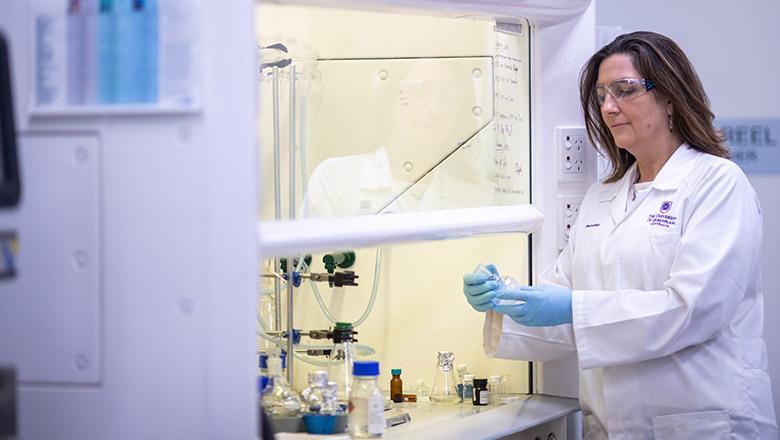
A new era in anti-inflammatory drug discovery
When Avril says there’s plenty of potential in the field of medical biotechnology, she doesn’t just believe it – she’s lived it. Avril joined The University of Queensland in 2011 after a decade-long career in industry, seeking a brand-new avenue of research.
She has since made breakthrough discoveries that led to patented drug development for inflammasome inhibition – specifically around the NLRP3 inflammasome, which is triggered in a large number of diseases including gout, diabetes, asthma, multiple sclerosis, rheumatoid arthritis and some cancers.
“At the time, there were no known potent and specific NLRP3 inflammasome inhibitors and all efforts to create one had proven elusive,” says Avril.
Avril's explanation of inflammasomes
"Inflammasomes are like switches that can turn on inflammation. This inflammation is designed to be short-term help for your body to fight infection or respond to injury. But if this inflammasome switch is faulty or permanently active, the resulting persistent inflammation can cause or drive disease."
Evidence in the literature led Avril to consider compounds that were tested and subsequently abandoned by Pfizer in 2000. This was before the discovery of inflammasomes, and the compounds did not make it further than early trials.
“I synthesised these compounds and worked with Dr Rebecca Coll, a lecturer at Queen’s University Belfast, to test them versus NLRP3 inflammasomes,” says Avril.
“The results were remarkable, illustrating unprecedented activity and specificity towards NLRP3 inflammasome inhibition.”
Avril successfully applied for an Australia-India Council grant, and so began a new drug-discovery campaign.
“Over several years, I used my extensive industry experience and knowledge of the drug-discovery pipeline to design, make and test hundreds of molecules,” she says.
“Overall, there was one series of molecules that outperformed all others, and even more exciting was that a subset of these molecules had the unique ability to cross the blood-brain barrier to have efficacy in the brain.”
This discovery meant the possible applications of the drug opened to include diseases that desperately need treatments, such as:
- Alzheimer’s disease
- Parkinson’s disease
- dementia
- traumatic brain injury
- ischemic stroke.
Avril wrote patents on the new molecules she invented, which were then licensed to found start-up company Inflazome in 2016. At $22 million, this became the largest series-A (i.e. first round of funding) investment deal for any Australian university.
Only four years later in 2020, Roche, the largest biotechnology company in the world, purchased Inflazome for around $600 million upfront with the full deal undisclosed. And while the Inflazome team continued to make their own progress, the existing discoveries and trials had also sparked exploration elsewhere.
“Other companies triggered drug discovery efforts, learning from our published patents to carve out their own patents,” says Avril.
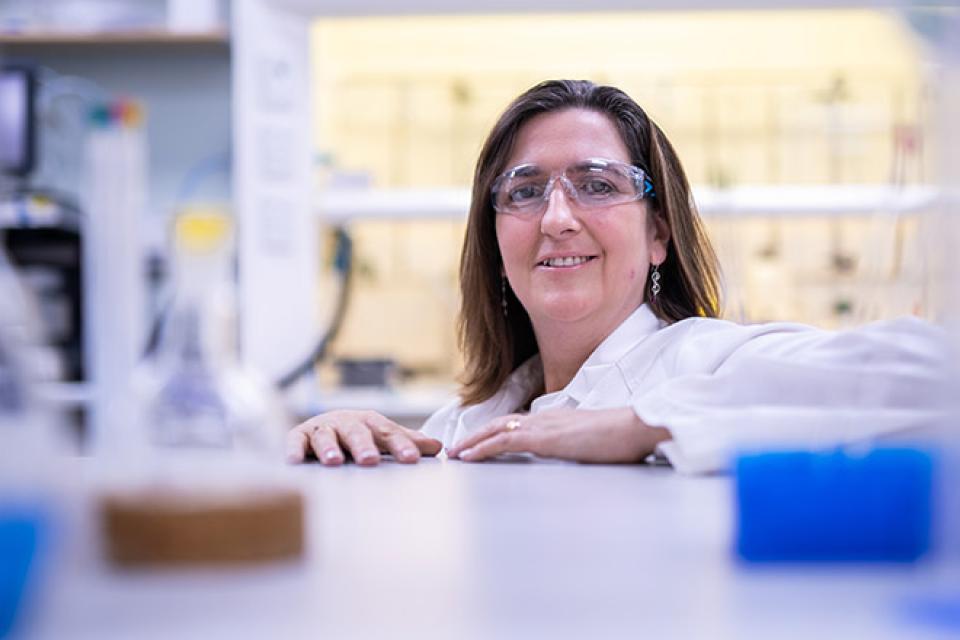
Biotechnology isn’t just medical
Medical biotechnology captured Avril’s curiosity, and it’s at the centre of many modern challenges including COVID-19 detection and vaccine development. Graduates in this field are doing important work across the board in laboratories, governments and commercial enterprises, and making a difference in areas such as:
- personalised medicine
- novel delivery methods for therapeutics
- stem cells and antibodies
- mRNA and DNA technologies
- digital health and wearable technologies.
However, Avril is quick to point out that biotechnology is broader than this.
“Medical biotechnology is only one part of the biotechnology rainbow,” she says.
“Biotechnology is very diverse and includes many scientific disciplines from chemical, biological, physics, engineering and computational skillsets to the legal, commercial and innovation space.”
The “biotechnology rainbow” as described by Avril
White: industrial biotechnology
Red: medical biotechnology
Gold: bioinformatics
Yellow: food biotechnology
Green: agricultural biotechnology
Blue: marine biotechnology
Purple: legal aspects of biotechnology
Black: the dark side of biotechnology (bioterrorism, biowarfare and biocrimes)
“There is an area of interest in biotechnology to suit everyone.”
Across all these disciplines, pioneering scientists like Avril are at the forefront of scientific discovery, working to make the world a better place. The next revolutionary breakthrough – whether it’s a new medicine, diagnostic test or nutritious food product – could be bubbling away in the depths of your mind, just waiting for a Master of Biotechnology to pull it to the surface.
Discover the Master of Biotechnology Explore all of UQ's postgraduate study options

